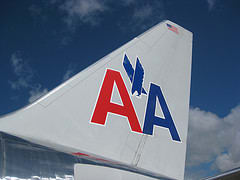
(benh57)
The L.A. Times’ David Lazarus has the story of American passenger who felt he had no other option than to pay a $42 fee for a premium seat because that’s all that was left when he went to check in several days before the flight.
“I figured, holy smokes, I better buy my seat right away or I’m not going to get one,” says the passenger. “They obviously were selling out or were overbooking the flight.”
But when he went back to the American website on the day of his flight to print out his boarding pass, there were suddenly 20 seats available, and one of the five premium seats he’d had to choose from days earlier had since been marked down to a standard seat.
Did all these people suddenly cancel?
Nope, says American. Those seats are being held for theoretical members of American’s “Elite” flier program.
“The reason seats appeared unavailable two days prior to the flight and then became available on the day of departure is due to the elite seat blocking/reservation process,” an AA rep explained to Lazarus. “American saves seats for our valued elite customers, who typically have a shorter booking window than other customers… When those seats go unfilled by elite customers, they become available for selection by any customer during the check-in window.”
While we understand that American might need to hold a certain number of seats for these frequent fliers in order to make the program worthwhile to participants, we think there are a few changes it could make to its check-in system that would prevent non-elite passengers from being forced into paying extra for seats when there are regular-price seats still to be had:
1. Be transparent during the check-in process. Flag those reserved-for-elite seats so that passengers can see whether or not these seats have been claimed by real passengers or if they are just being held for theoretical passengers.
2. Don’t exclude premier seats from being included in those held for elite fliers. Once all non-premium seats are claimed by actual passengers, the hypothetical elite fliers should spill over into the premier seats, rather than forcing non-imaginary travelers to pay more.
3. Seats are either premium or they aren’t. You shouldn’t say that a seat is worth $42 more because it has extra legroom and then decide later that those few inches are not worth the additional money.
4. Refund the up-charge to passengers who were forced to pay extra when seats were actually available. When the passenger in the L.A. Times story attempted to get a refund at the airport but an AA agent told him there was nothing that could be done about it. If the airline is going to hold seats for these phantom fliers and compel passengers to pay a fee, it should give that money back when not all of those wished-for elite travelers show up.
Of course, we don’t actually expect American or any other airline to make changes like this, as that would go against the trend of nickel-and-diming their customers.
But if you’re going to check in on your flight and you see that, days before take-off, only premium seats are available, you might want to hold off on checking in to see if the airline releases those seats on the day of the flight.
Editor's Note: This article originally appeared on Consumerist.
















